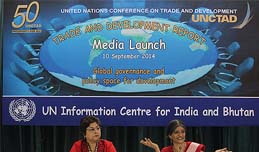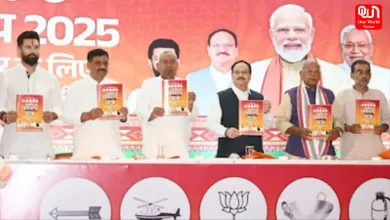How to Progress?

How to Progress?
The United Nations Conference on Trade and Development (UNCTAD) on its media launch of Trade and development Report 2014 on 10th September at UN Conference Hall presented the facts and data about how developing country like India can turn itself into a developed one. The seminar also highlighted the problems faced by the developing country in doing so.
Dr. Jayati Ghosh, a Professor of JNU threw light on the matters of economic conditions in India saying, “If developing countries come together, they can make great changes in the global economy.”
With the expected growth of 2.5 to 3 per cent in 2014, the global recovery remains weak, while the policies supporting it are not inadequate but often inconsistent, the Report argues.
Developing countries have managed to recover from the great recession after 2008, which is faster than the developed countries. However, there are limits which can be achieved by counter cycling policies and gains from the term of trade.

Developing countries will also have to face the challenge of persistent instability of the international financial system.
Points were also given for making tight fiscal policy and making labour markets even more flexible for the Indian markets to prosper it at a greater level. The report also insisted that the main problem in post crisis period is the insufficient aggregate demand and continuing financial instability and both of these issues reflect policy choice.
The economists used their own research and based on it, developed a model to make people understand about the growth of land price in UK and US which can cause a great change in the world economy.
One of the most common agenda emphasized was the expanding policy space. A policy space is the space and power available to the governments to make any policy.
International capital flows usually generate a financial cycling in the receiving countries and often increase their financial fragility, eventually, leading to a financial crisis. In order to obtain a financial condition that supports the growth policy makers, it should maintain suitable policy for managing capital flows at their disposals.
The new report insists that the capital management measures should be a normal instrument in the policymaker toolkit. Multilateral rules in the Articles of Agreement of the International Monetary Fund and the General Agreement on Trade in Services of the World Trade Organization do allow governments to manage their accounts and also, in controlling capital.







